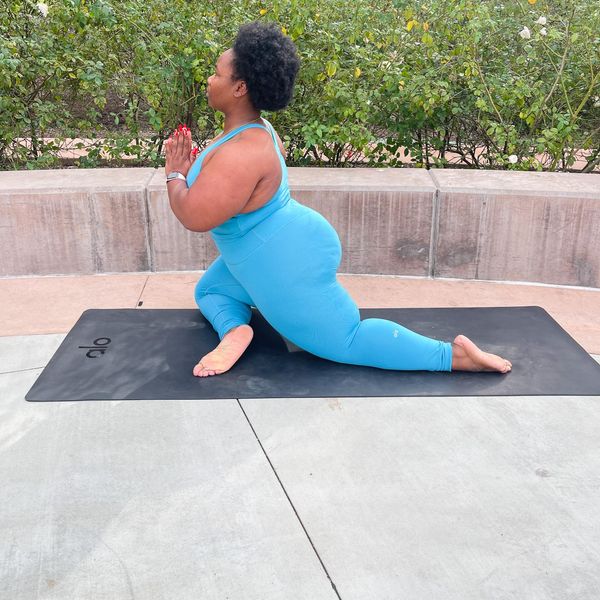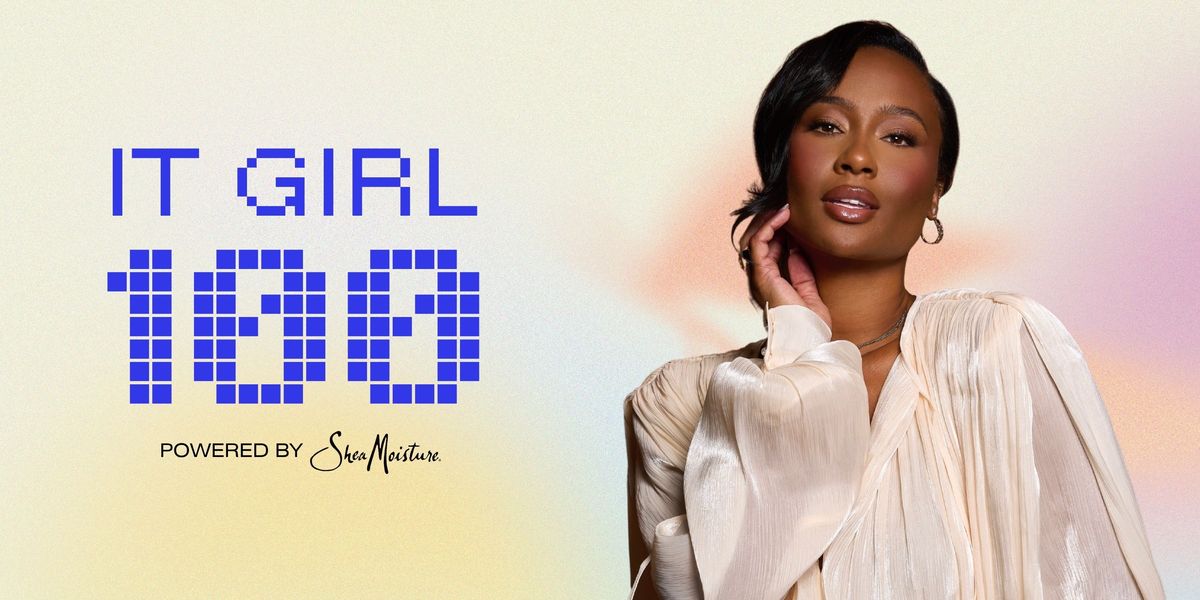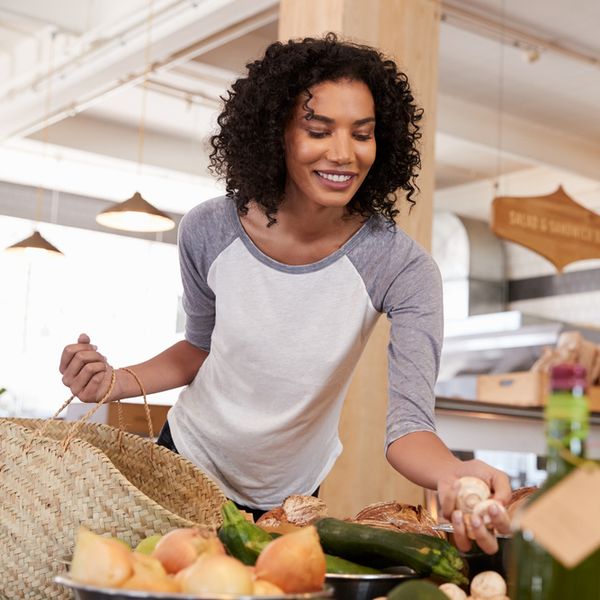
Something that my mother used to say, fairly often about me, is that I'm violent about getting (emotionally) healthy and maintaining my peace of mind. While it is a bit of a play on words (you know, being "violent" in order to "keep the peace"), I won't lie…she is exactly right. The older—and prayerfully wiser—I get, the more I tend to repel anything that is counterproductive in my world.
On the heels of that, the more I study about how stress plays a direct role in illnesses like heart disease, diabetes, depression, obesity, and even premature death, the more intentional I am about maintaining my overall health and well-being. A part of that means keeping my stress levels low.
Take the stress hormone known as cortisol, for example. While this steroid hormone plays a significant role in increasing our body's metabolism, controlling our blood pressure, and reducing how much inflammation our system produces, it can cause all sorts of health-related issues when it's out of balance. When your cortisol levels are too low, that can result in things like fatigue, muscle weakness, and weight loss. When it's too high, that can ultimately lead to weight gain, irregular periods, acne, mood swings, slow healing (especially when it comes to your skin), headaches, and high blood pressure.
While rest, exercise, and meditation are a few ways to naturally increase your cortisol levels, if yours tilts towards the higher side, there are foods that you can eat to naturally decrease them too. So, if your period has been a little erratic lately or your blood pressure has been a little higher than usual, after seeing your doctor (for a clear diagnosis), consider adding some of the following foods to your diet.
As you're about to see, they are proven to be good for you on so many levels, including when it comes to getting your cortisol levels back on track.
1. Blueberries
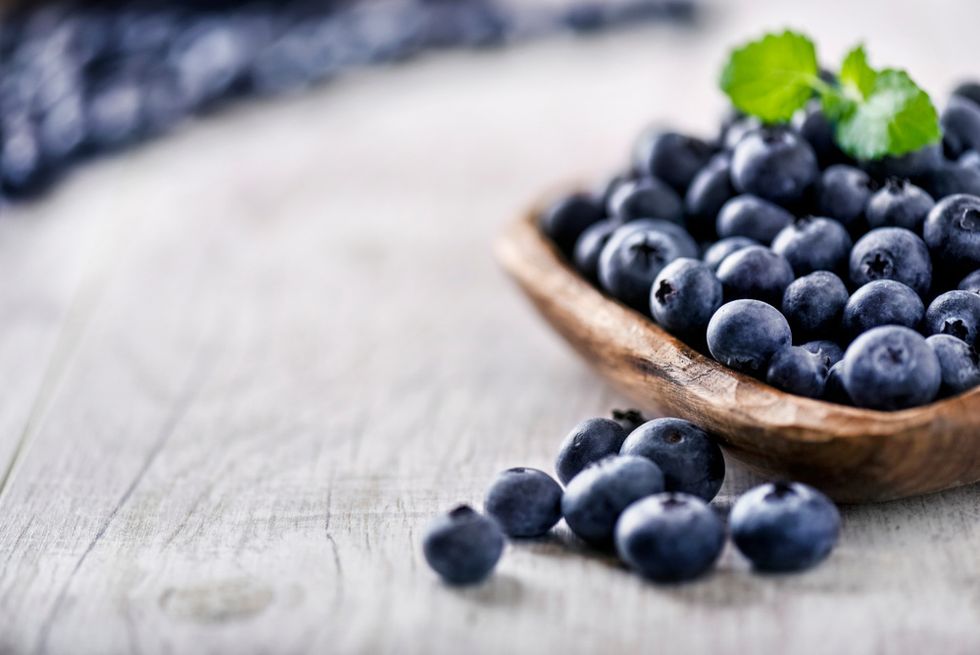
If you like to snack on blueberries, you are definitely doing your body good for a myriad of reasons. Blueberries are high in vitamins C and K. Blueberries contain anthocyanins, which have anti-inflammatory, anti-viral, and anti-cancer compounds in them. Blueberries also contain calcium and iron to keep your bones healthy, fiber to aid in healthy digestion, and properties to help your brain maintain its short-term memory.
The reason why blueberries are great for decreasing your cortisol levels is that they are low in sodium and high in magnesium. The balance of both of these plays a direct role in keeping your blood pressure in check, which is always a good thing.
Blueberries Tip: You can keep blueberries from molding while helping them to last longer by adding a cup of white vinegar to three cups of distilled water. Let your fresh blueberries soak in the solution for 10 minutes, then drain them, run them under cold water, and dry them with a couple of paper towels. Then all you have to do is store them in a sealable container, place them in the fridge, and they can easily last for up to two weeks.
2. Black Tea

Black tea is a really great drink. It contains the antioxidants theaflavins and thearubigins, which are able to strengthen your immune system and help to keep diabetes at bay. Black tea also has flavonoids that can help keep your heart strong. Some other cool things about black tea is it's able to remove bad bacteria in your gut, it has compounds that can lower your blood pressure, and there are properties in it that can reduce your risk of having a stroke by as much as 21 percent (if you drink a cup of black tea per day).
The reason why it makes this particular list is because, when elevated cortisol levels result in a rise in your heart rate, consuming black tea can decrease the cortisol in your system by as much as 47 percent. Pretty impressive, indeed.
Black Tea Tip: Not the biggest fan of how black tea tastes? Try Food Network's Honey Citrus Southern Iced Tea recipe here.
3. Cannellini Beans
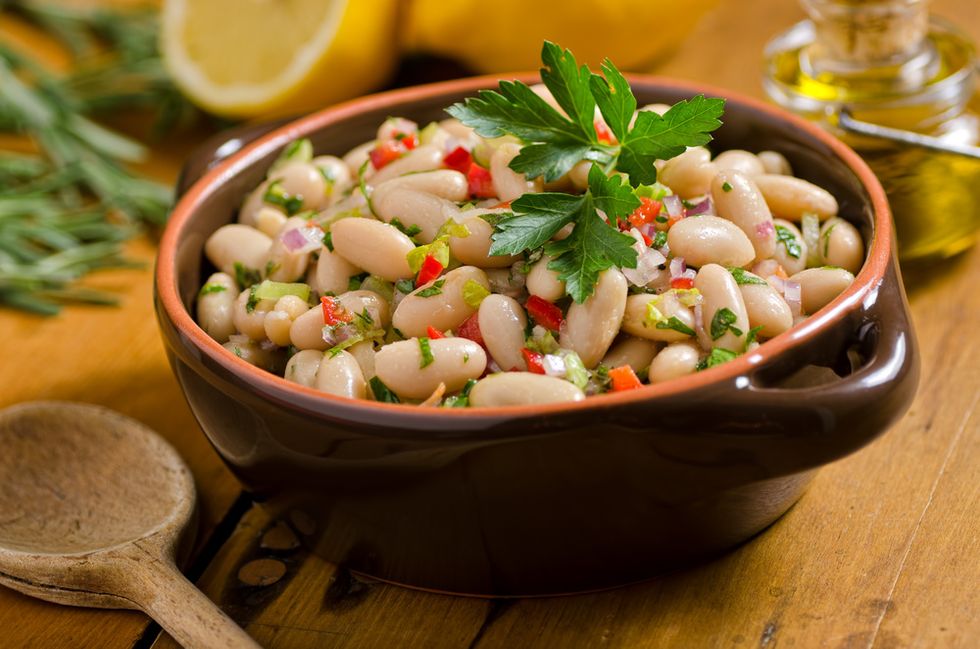
Never heard of these types of beans before? Basically, they are white beans that are super popular in Italian, Greek, and French cuisines. Because cannellini beans are considered to be a macronutrient that is high in protein, iron, potassium, and calcium, yet doesn't contain any amount of fat, I'm pretty sure you can see why they are top of the list of being a dietary recommendation.
As far as health benefits go, cannellini beans help to lower blood sugar and blood pressure levels, reduce free radicals and body inflammation, so it makes total sense why you should pick some up if you want to keep your cortisol levels in check.
Cannellini Beans Tip: Put a new twist to cannellini beans by making some Cannellini-Bean Pasta with Beurre Blanc. You can get step-by-step instructions here.
4. Dried Apricots
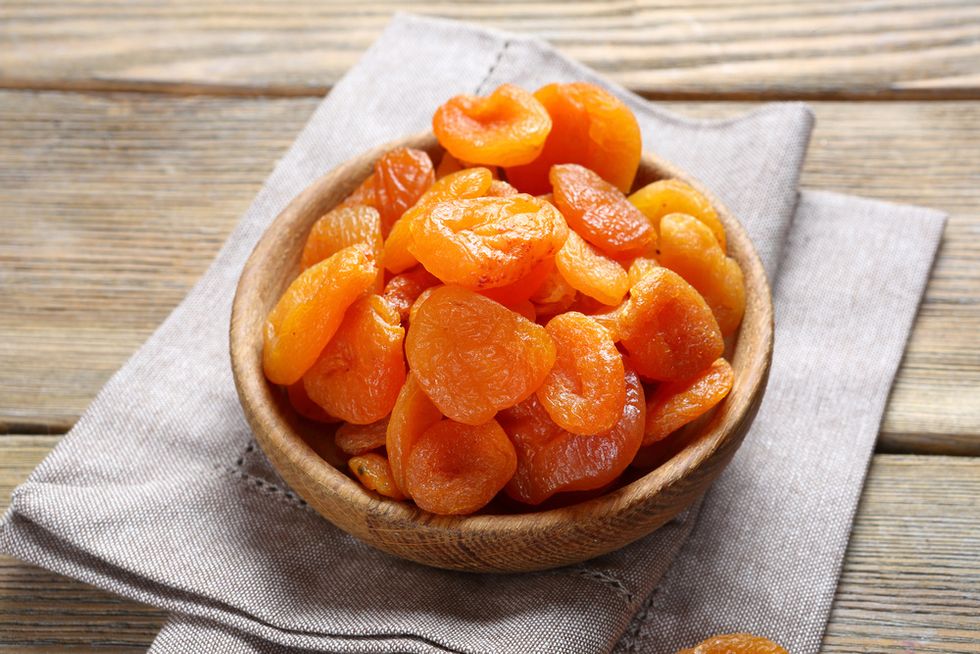
If you're looking for more healthy snacks to add to your diet, how about some dried apricots? They are low in calories while being high in fiber, calcium, and magnesium. Since dried apricots also have a good amount of vitamin A in them, they are able to boost your immune system, encourage cell growth, maintain your vision, strengthen your bones, and even assist in healthy embryonic development if you happen to be pregnant. Something else that dried apricots have in them is potassium.
When cortisol levels are elevated, a decrease in potassium comes as a direct result (this results in fatigue, muscle cramps, mood swings, heart palpitations, and breathing difficulties). Eating foods with potassium in them can help restore the potassium in your body that has been lost.
Dried Apricots Tip: If you want to take a stab at making some apricot fruit roll-ups, Natasha Kitchen's website has your back. Check out "How to Make Apricot Fruit Leather" to get the recipe.
5. Holy Basil
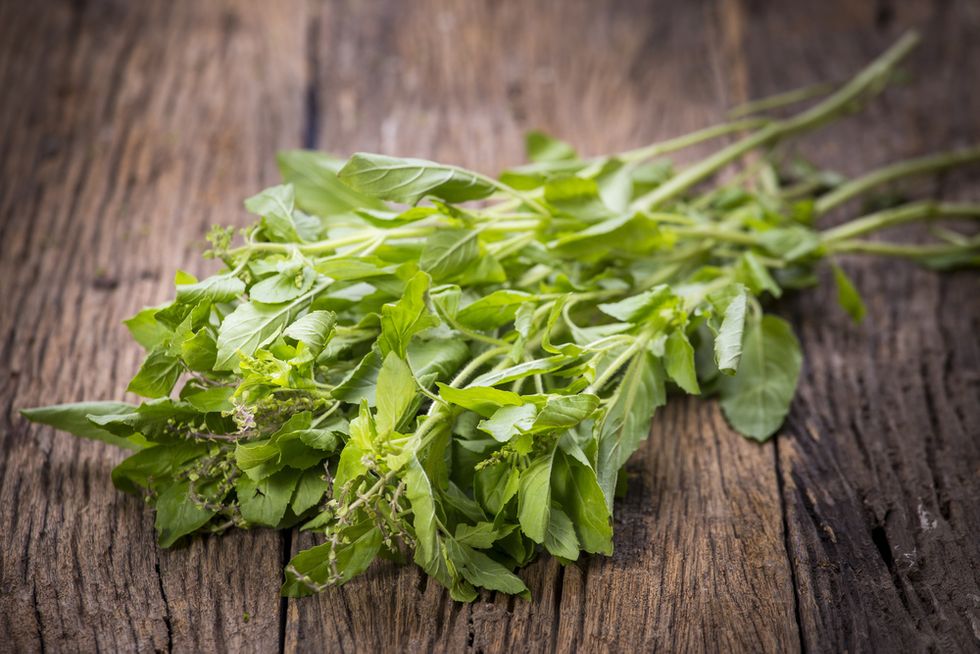
Here's what's a trip about holy basil—it's literally an adaptogenic herb. What that means is it's the type of herb that helps your body to build up a resistance to stressors that might try and attack your body. Holy basil is antibacterial, antiviral, antifungal and anti-inflammatory. Because of this, it increases energy levels, lowers inflammation, improves brain function, strengthens organ function, and yes, balances out your cortisol levels.
Just make sure that you don't give it to infants or children (studies on its safety for them are on-going) and that you only take it for six weeks at a time, should you choose to use it in supplement form. The reason why is because holy basil is so potent that it's not a good idea to take larger quantities without taking breaks in between.
Holy Basil Tip: How should you store this fresh herb? First, make sure to clip the ends of it. Then, place the herb into a glass jar or vase. Cover up the jar and store it in the refrigerator. It will last for a week if you do. Or, you can cut up the leaves of the herbs, put them into ice trays that are filled with water. If you then transfer the cubes to a large resealable plastic bag, the cubes can keep for up to a year.
6. Mangoes
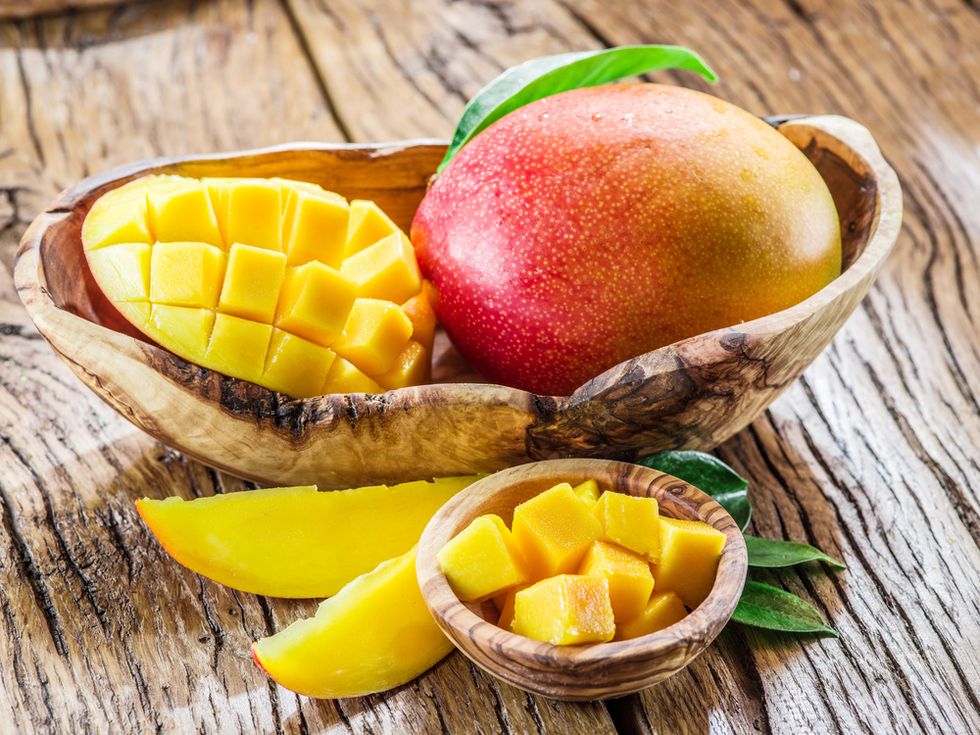
Mangoes are as good for you as they taste. They are high in antioxidants, the combination of vitamins A and C can help to keep your skin clear, and, because they are on the lower end of the glycemic index scale, this means that they can tackle the sweet cravings you might have if you happen to be diabetic.
If high cholesterol is something that you struggle with, mangoes can assist with that, too. How? Well, since they are a fruit that contains high levels of fibre pectin, mangoes are able to reduce the cholesterol in your system that can lead to plaque in your blood vessels, which can ultimately restrict blood flow to your heart.
Mangoes Tip: Sick of mangoes turning brown quicker than you can finish eating them? If so, once you slice a mango up, put the slices into some fresh lemon juice. The acid will slow down the browning process without interfering with the taste of the mango itself.
7. Olive Oil
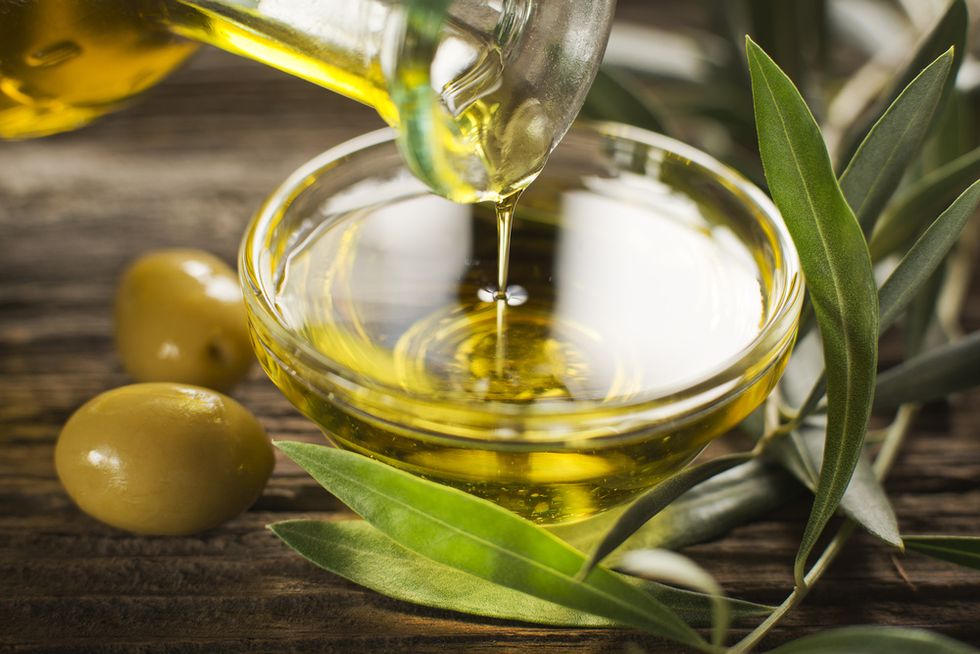
Out of all the different kinds of oil that you have to choose from, you should definitely have olive oil in your kitchen pantry. It's loaded with omega-6 and omega-3 fatty acids, antioxidants, and it has anti-inflammatory properties in it. Also, unlike a lot of other oils that can do the opposite (of what I'm about to say) over time, studies reveal that olive oil can help to prevent heart disease and strokes, fight off cancer cells, effectively treat rheumatoid arthritis, plus it does not lead to weight gain. As a bonus, because olive oil contains the compound oleuropein, it can lower cortisol levels too.
Olive Oil Tip: There are basically three different kinds of olive oil— refined, virgin, and extra virgin. If you want to consume the one that has the most health benefits, it's best to go with extra virgin olive oil. That's because it is the least processed and refined.
8. Salmon
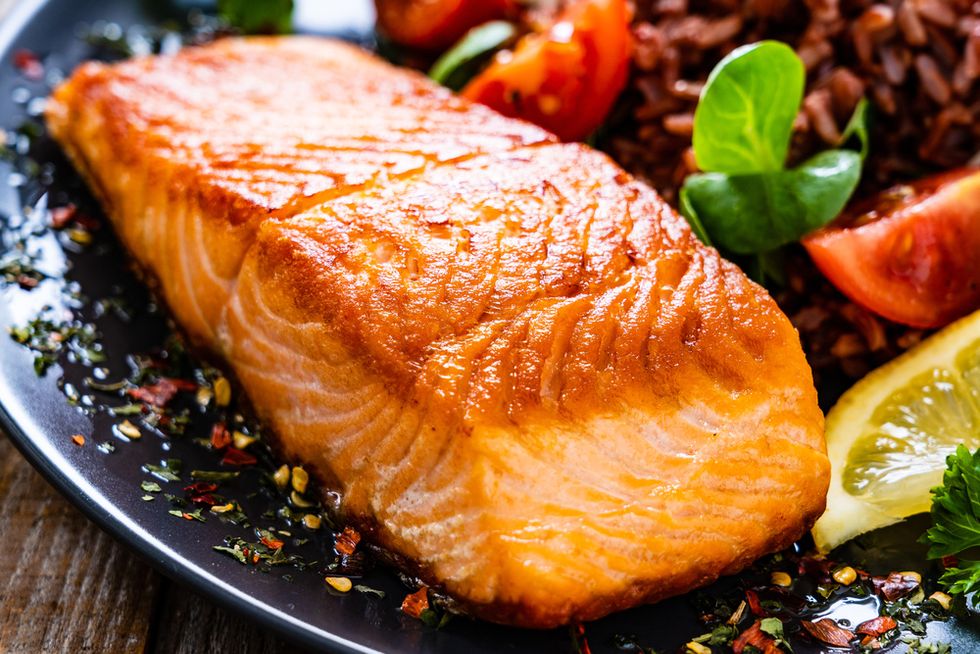
Salmon is probably my favorite kind of fish. I like that it's not super fishy in taste and has a light texture. Anyway, I always feel good whenever I eat it because I know that it's looking out for my physical health whenever I do. Salmon is rich in omega-3s, B vitamins, and protein.
It's also high in potassium, selenium (a mineral that protects your bone health and your thyroid,) and astaxanthin. Astaxanthin is a compound that reduces oxidation in your system. As a result, it can help to keep your cortisol levels from getting out of control.
Salmon Tip: If you want to get the most nutritional benefits from eating salmon, try poaching it. Poaching pretty much consists of placing salmon filets in a shallow saucepan, along with water, wine, or bone or vegetable broth for about 10 minutes; just enough for the salmon to not be raw without being overcooked.
If you want to check out a video on how to prepare salmon this way, click here.
9. Walnuts
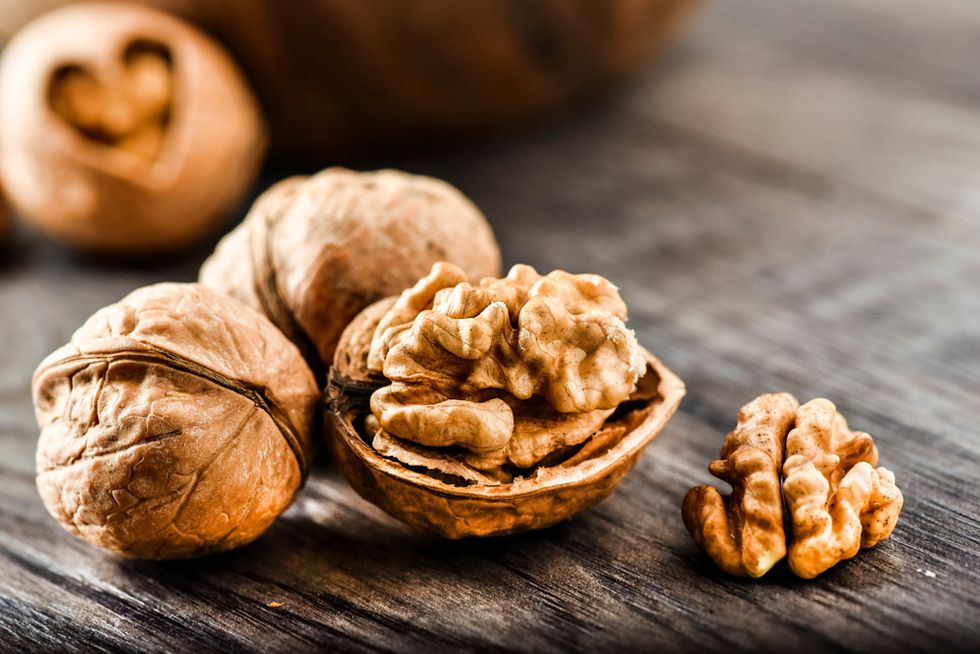
As far as nuts go, walnuts are packed with all kinds of health benefits. Not only are they also a food that are high in antioxidants, but they are a great source of omega-3, selenium, calcium, zinc, and vitamin E. If you're looking for a food that promotes a healthy gut, lowers your risk of having type 2 diabetes, and even helps your body to age gracefully, walnuts can handle all of this.
Because these are the types of nuts that significantly decrease oxidative stress to your system, they are something else that you can eat to get your cortisol levels down, too. Very cool.
Walnuts Tip: Have you ever wondered how to caramelize your own walnuts? All you need to do is put one cup of walnuts, ¼ cup of brown sugar, and one tablespoon of butter into a non-stick skillet. Over medium heat, stir the nuts and the mixture together for about five minutes. Then transfer the nuts to parchment paper, making sure to separate the nuts so that they don't stick together. Allow the mixture to cool for 10 minutes, and then your nuts will be ready to eat. Enjoy!
Let’s make things inbox official! Sign up for the xoNecole newsletter for love, wellness, career, and exclusive content delivered straight to your inbox.
Featured image by Shutterstock
Originally published on June 7, 2020
- 8 Foods That Keep You Calm And Relaxed - xoNecole: Women's ... ›
- How To Take Care Of Your Gut - xoNecole: Women's Interest, Love, Wellness, Beauty ›
- 10 Foods That Will Keep You Cool During The Heat - xoNecole: Lifestyle, Culture, Love, Wellness ›
- Bone Broth Soups In A Mason Jar TikTok Recipes Benefits - xoNecole: Lifestyle, Culture, Love, Wellness ›
- How To Lower Cortisol: Natural Ways To Lower Cortisol - xoNecole ›
RELATED
Exclusive: Viral It Girl Kayla Nicole Is Reclaiming The Mic—And The Narrative
It’s nice to have a podcast when you’re constantly trending online. One week after setting timelines ablaze on Halloween, Kayla Nicole released an episode of her Dear Media pop culture podcast, The Pre-Game, where she took listeners behind the scenes of her viral costume.
The 34-year-old had been torn between dressing up as Beyoncé or Toni Braxton, she says in the episode. She couldn’t decide which version of Bey she’d be, though. Two days before the holiday, she locked in her choice, filming a short recreation of Braxton’s “He Wasn’t Man Enough for Me” music video that has since garnered nearly 6.5M views on TikTok.
Kayla Nicole says she wore a dress that was once worn by Braxton herself for the Halloween costume. “It’s not a secret Toni is more on the petite side. I’m obsessed with all 5’2” of her,” she tells xoNecole via email. “But I’m 5’10'' and not missing any meals, honey, so to my surprise, when I got the dress and it actually fit, I knew it was destiny.”
The episode was the perfect way for the multihyphenate to take control of her own narrative. By addressing the viral moment on her own platform, she was able to stir the conversation and keep the focus on her adoration for Braxton, an artist she says she grew up listening to and who still makes her most-played playlist every year. Elsewhere, she likely would’ve received questions about whether or not the costume was a subliminal aimed at her ex-boyfriend and his pop star fiancée. “I think that people will try to project their own narratives, right?” she said, hinting at this in the episode. “But, for me personally – I think it’s very important to say this in this moment – I’m not in the business of tearing other women down. I’m in the business of celebrating them.”
Kayla Nicole is among xoNecole’s It Girl 100 Class of 2025, powered by SheaMoisture, recognized in the Viral Voices category for her work in media and the trends she sets on our timelines, all while prioritizing her own mental and physical health. As she puts it: “Yes, I’m curating conversations on my podcast The Pre-Game, and cultivating community with my wellness brand Tribe Therepē.”
Despite being the frequent topic of conversation online, Kayla Nicole says she’s learning to take advantage of her growing social media platform without becoming consumed by it. “I refuse to let the internet consume me. It’s supposed to be a resource and tool for connection, so if it becomes anything beyond that I will log out,” she says.
On The Pre-Game, which launched earlier this year, she has positioned herself as listeners “homegirl.” “There’s definitely a delicate dance between being genuine and oversharing, and I’ve had to learn that the hard way. Now I share from a place of reflection, not reaction,” she says. “If it can help someone feel seen or less alone, I’ll talk about it within reason. But I’ve certainly learned to protect parts of my life that I cherish most. I share what serves connection but doesn’t cost me peace.
"I refuse to let the internet consume me. It’s supposed to be a resource and tool for connection, so if it becomes anything beyond that I will log out."

Credit: Malcolm Roberson
Throughout each episode, she sips a cocktail and addresses trending topics (even when they involve herself). It’s a platform the Pepperdine University alumnus has been preparing to have since she graduated with a degree in broadcast journalism, with a concentration in political science.
“I just knew I was going to end up on a local news network at the head anchor table, breaking high speed chases, and tossing it to the weather girl,” she says. Instead, she ended up working as an assistant at TMZ before covering sports as a freelance reporter. (She’s said she didn’t work for ESPN, despite previous reports saying otherwise.) The Pre-Game combines her love for pop culture and sports in a way that once felt inaccessible to her in traditional media.
She’s not just a podcaster, though. When she’s not behind the mic, taking acting classes or making her New York Fashion Week debut, Kayla Nicole is also busy elevating her wellness brand Tribe Therepē, where she shares her workouts and the workout equipment that helps her look chic while staying fit. She says the brand will add apparel to its line up in early 2026.
“Tribe Therepē has evolved into exactly what I have always envisioned. A community of women who care about being fit not just for the aesthetic, but for their mental and emotional well-being too. It’s grounded. It’s feminine. It’s strong,” she says. “And honestly, it's a reflection of where I am in my life right now. I feel so damn good - mentally, emotionally, and physically. And I am grateful to be in a space where I can pour that love and light back into the community that continues to pour into me.”
Tap into the full It Girl 100 Class of 2025 and meet all the women changing game this year and beyond. See the full list here.
Featured image by Malcolm Roberson
What Is A 'Vulnerable Narcissist'? How It Creeps Up In Female Friendships.
Narcissist. Boy, if there is a word that has been used — and, in many ways, misused — to death, especially on social media, that would be the one. I say that because the folks who think that just because a relationship didn’t go as planned, or they no longer gel with someone, that it must be because that person is a narcissist? Whew, chile.
So, let me just say before we get into today’s topic that one, I won’t really be referring to narcissistic personality disorder; people who have that are diagnosed by professionals — not randoms on social media who like to Google a lot. Nah, this is more about how some individuals display several traits of being narcissistic — and for the sake of this article, the traits of being a vulnerable narcissist, specifically.
I was inspired to write this because, recently, while reading about eight types of narcissists and what their traits consist of, I revisited what a vulnerable narcissist is all about. Then, as I connected some dots via another piece that I read about how it shows up in female friendships — well, because this is a platform for Black women, I definitely wanted to put y’all on notice. Because when it comes to toxic friendships (which really is a bit of an oxymoron, isn’t it?), there is probably nothing worse than having a narcissist friend — someone who displays traits like being highly self-centered, pretty apathetic, and constantly gaslighting those around them.
Okay, so what’s the difference between a “regular” narcissist and a vulnerable one? Yeah, let’s get into that now because I’ve got a feeling that some light bulbs are going to go on for a few of you…as it relates to at least one of your current…“friendships.”
So Basically, a Vulnerable Narcissist Is the Same Thing As a Covert One
 Giphy
GiphyIf you check out the article, “Science Says That Happy Couples Do The Following 7 Things” on this platform, one thing that you will notice that I said is, since I’ve been a marriage life coach, I’ve not really been big on using the word “vulnerable” when it comes to serious relationships. Charge it to being a writer who takes words pretty literally (dictionary-defined ones, not what social media makes up from year to year) yet I’ve never understood why we should encourage people to be vulnerable with someone who they deeply trust.
I say that because I know that vulnerable means things like “capable of or susceptible to being attacked, damaged, or hurt” and “open to moral attack, criticism, temptation, etc.” And although I get that no one is perfect, if you feel like dealing with those closest to you requires taking this level of an emotional risk, on a fairly consistent basis? In my opinion, that is a dark orange flag, if not a flat-out red one.
I’ve said before that my preferred word is “dependent” because it means “relying on someone or something else for aid, support, etc.” — and healthy relationships? They absolutely should be INTERDEPENDENT. Yeah, whether it’s romantic, familial or a friendship — why are you out here feeling like sharing yourself makes you open to attack and harm when you should be involved with individuals who can be relied on for support? See the difference? And that is why a vulnerable narcissist makes sense to me — since a narcissist is unsafe, by the very definitions of vulnerable, a vulnerable one would be too. Even more so, in fact.
Here's the clincher, though. Even if you’ve never heard of a vulnerable narcissist before, I’m willing to bet that some of you have heard of a covert narcissist, which is basically the same thing. The fascinating thing about a covert narcissist is they are more subtle than some of the other types — which is exactly how they are able to trip folks up. Because although they need lots of attention and they tend to act really self-important (like all narcissists do), a covert narcissist moves in some pretty sneaky ways.
For instance, they might go really heavy on what seems like compliments (more on that in a sec) in order to make you think that they admire you when, really, they just want to get your guard down in order to get whatever they want out of you. Another example of a covert narcissist is they might act like they are proud of something you accomplished; however, they are actually sticking close by to get some of your contacts or to work themselves into the successful world that you created, so that they can actually compete with you. One more example of a covert narcissist is if they don’t get their way, they may ghost you for days, weeks or months at a time and then be all passive aggressive about it whenever they resurface.
And why are they like this? Because vulnerable/covert narcissists get off on gaslighting — they want you to feel like you are crazy for thinking what is, 8.5/10, spot-on about them. That way, you can be the villain and they can play the victim — even though it’s probably the exact opposite that is actually going on. They do this because, ultimately, to boost their ego. For a narcissist, pretty much of any kind, game-playing is what fuels them and makes them bigger in their minds than they actually are (or even deserve to be).
10 Dead-Ringer Signs of a Vulnerable Narcissist
 Giphy
GiphyOkay, so even with all of what I just said, what if you’re like, “Shellie, I think I get it, but I need a few more examples of what you’re saying”? I hear you and I’ve got you. Some other ways that vulnerable narcissists like to show up and out?
- They are hypercritical and condescending
- They act like they are allergic to accountability
- Their expectations are unreasonable (and hypocritical)
- They are walking contradictions
- They want to be the center of attention (and while monopolize things
- They are masters at giving others the silent treatment
- Their expectations are unrealistic and their demands are ridiculous
- They deflect instead of apologize
- They flatter (use fluffy and insincere words) yet don’t affirm or compliment (yes, there is a difference)
- They lack empathy or humility
And why — or even how — would you be a friend with someone like this? Well, the other thing that you have to keep in mind about narcissism is they are excellent at using charm to their advantage. Charming people tend to come off as being charismatic and witty. Charming people seem to be really interested in you (at least initially). Charming people have a way of making you feel very comfortable around them. At first, charming people seem genuine, attentive and respectful. And they definitely make a good impression — sometimes one that is so solid that you keep going back to that memory during the “bad times” with them.
Hmph. The thing that you have to always keep in mind when it comes to charm, though, is what Scripture says about it: “Charm is deceitful…” (Pr. 31:30) — and that is just what a narcissist is: deceptive.
And when it comes to a vulnerable narcissist and her friendships with other women? The deceptive runs deep.
How a Vulnerable Narcissist Shows Up Especially in Female Friendships
 Giphy
GiphyAlways remember that a vulnerable narcissist moves in subtle and sneaky ways. Hmph, that alone should make you want to ponder if you have some female friends who would fit the bill of being a vulnerable narcissist because we do have a way of being clever and ingenious…which are two of the things that come with being a subtle type of individual. And the way that subtle narcissists use their clever and ingenious ways to their advantage? I’ll give you an example.
A former friend of mine who was — and from what I hear, still is — an absolute vulnerable narcissist really wanted me to be her fan rather than her friend. One time, she even invited me to a bachelorette party and said, “You’re the only one here who isn’t a bridesmaid. You should feel honored.” Nah, what you really said is that you don’t truly value what I bring into your life enough to be a bridesmaid but you know I am good for bringing one hell of a gift and cheering you on regardless.
And that’s how a lot of our friendship was — doing way more giving than I was receiving, doing way more listening than leaning and when I would call her out on some of these things, she would either freeze me out or play the victim and act like somehow it was my fault that she wasn’t being a better friend.
Yeah, that’s what you’ve gotta watch about vulnerable narcissists — it is going to be oh so very rare that they will take full accountability for where they have dropped the ball. To them, somehow, it — whatever “it” is — is either going to be your fault or someone else’s. And that’s why, in their eyes, if you were a “real friend” to them, you would coddle them through not meeting your needs instead of expecting them to actually change their ways so that you both could benefit from the relationship.
And why don’t your needs matter? Because, to a vulnerable narcissist, they believe that they are worthy of extra special treatment at all times — think of them like being a bridezilla 24 hours a day. LOL.
And although some of what I said can be nuanced, for the most part, that really is how a vulnerable narcissist tends to make themselves seen and heard in female friendships: treat them like queens and expect to be mere subjects in their court or…why are you around at all, chile?
5 Hacks for Handling a Vulnerable Narcissist
 Giphy
GiphyFeeling triggered? Or better yet, are you feeling like you finally can “scratch the itch” of what you’ve been looking for to describe a certain person (or certain people) in your life goes? If that is the case and although you see some flags, there tends to be at least a little bit of good enough in your dynamic with “your” vulnerable narcissist to not totally break things off (yet), how do you keep a vulnerable narcissist from causing (anymore) harm?
1. Set firm boundaries. The former friend who I just spoke of? It took years to fully and finally unravel out of all of that (pretty much because she took her elitism to “no turning back” levels a few years ago). A part of the reason why is because she’s not the devil; she really isn’t — she’s just a narcissist. So, what I did to make things more bearable for myself for a while was set some emotional boundaries.
Sometimes I had to tell her “no” and provide no explanation behind it (narcissists think that they are owed every damn thing, chile). I refused to be at her beck and call all of the time. When I felt like she was stressing me out, I would take a bit of time off from phone calls or hanging out. Listen, you will never survive a narcissist, of any kind, unless you have some firm and consistent ARTICULATED boundaries set. If you don’t heed any other point, please heed this one.
2. Have consequences in place for when they are broken. There is no point in setting a boundary if there aren’t going to be consequences for when they are broken. So, for instance, if you tell a vulnerable narcissist that you don’t appreciate them not taking accountability for telling your business to a mutual friend (because they are also extremely entitled individuals), you should probably keep your mouth shut around them for a while. Narcissists care more about their present interests than your holistic comfort which is why they tend to do stuff like that (sometimes).
3. Look at patterns over promises. Narcissists are a lot like energy vampires — and something that both of those need is a source of supply to leech off of whether it’s attention, emotional investing, resources…whatever will benefit them and what they are wanting at the time. And that is why they have no problem telling you that they will do something for you…even if they don’t end up following through. They do this because they want you to put enough confidence in them to be willing to go out of your way on their behalf — at least until they get what they need in the moment. Be careful of that. In genuine friendships, you should be able to rely on others just as much as they should be able to rely on you.
4. Choose to not see them as your “safe place.” Remember, narcissists are charming. They can also be witty, fun and totally entertaining to be around. A word that I wouldn’t use for them, though, is “safe.” The former friend who I mentioned? Although she was good at keeping information confidential (which is a safe trait), she couldn’t be relied on when I was hurting because, somehow, she was going to find a way to turn the focus on her (that is unsafe). I mean, rarely could I tell her something and she wasn’t going to turn it into a story about herself. Yeah, narcissists are always on some sort of makeshift stage, chile. And that can be exhausting.
5. Make sure you know what your “breaking point” is. I tell clients often: Be okay with being someone’s consequence sometimes because there may be a chance that they won’t learn any other way. Do I miss that former friend of mine? Eh, by the time that I was done, I was DONE done. However, we had a lot of years between us and so there are memories that get to me on random occasions. And although I don’t hate her and can see her and genuinely care about how she’s doing, we have nowhere to go in the future. She’s always going to want me to do most of the work — and I am no longer interested in doing so. Breaking points are good. They let us know when a chapter in a relationship has…completed itself.
____
An author by the name of Nassim Nicholas Taleb once said, “Love without sacrifice is theft” (that kind of makes me think of the late author Eric Jerome Dickey’s quote, “Sex without love is violence”). At the end of the day, that saying is a good way to “gut check” your relationship with a vulnerable narcissist. Ask yourself if you are basically the only one doing any sacrificing. And if that is indeed the case, is it worth it?
Remember, a vulnerable narcissist thinks that they deserve to be treated better than everyone else — including you. If you want to keep that type of person as a friend, just know what you are getting yourself into. Because since they are probably never going to change, you will be the one who has to.
One way or another, sis. One way or a freakin’ other.
Let’s make things inbox official! Sign up for the xoNecole newsletter for love, wellness, career, and exclusive content delivered straight to your inbox.
Featured image by Dragon Images/Getty Images





